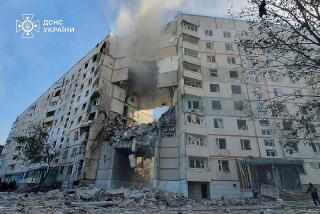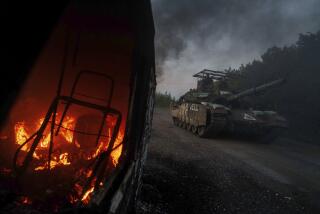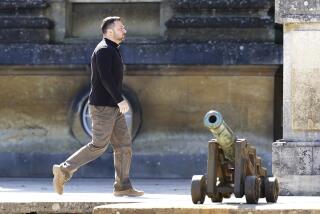Reduced to Ruin, Chechen Capital Is Up for Grabs
- Share via
GROZNY, Russia — Shelling echoes from the east. Sniper fire rattles down a nearby avenue. In the ruins of central Grozny, a cease-fire has been in place--more or less--for two days.
The Chechen separatists in the wasteland that was once the capital’s central market purposefully ignore the shooting and continue to nudge out a damaged Russian tank from the debris of battle.
More rebel fighters, clasping guns and grenade launchers, linger in the shelter of ruined buildings. Others trot cautiously across stinking heaps of garbage and shattered stalls in what has become their headquarters since they won back the city from Russian forces in a fierce 10-day battle.
How long the separatists can hold the city is anyone’s guess.
From Grozny, they ruled Chechnya as a self-declared independent republic for three years until Russian President Boris N. Yeltsin’s army routed them in early 1995. Now, after 20 months of warfare that has ruined much of it, Grozny is up for grabs again.
“Until the two sides are separated, there will always be shooting, however much we want to avoid it,” says Isa Astaminov, headquarters chief of what the separatists call the southwestern front.
“But it doesn’t mean there is real fighting going on,” he adds. “And those explosions in the distance are from the Russian side.”
Russian forces still in Grozny are surrounded at their bases by Chechen fighters. Local commanders of both Chechen and Russian forces are making plans to retrieve and bury their dead, Astaminov says.
To fend off any large-scale attack, Astaminov says, the Chechen forces of the southwestern front are gathering up a dozen or so tanks and armored vehicles won from the Russian enemy, along with grenade and rocket launchers.
Grozny’s ruined avenues, almost empty of people, are eerily quiet.
Few but rebel fighters dare venture far from home. Those who do so are planning to leave town altogether, joining the cars and pedestrians trailing away through back alleys to the countryside.
But the city center is still full of frightened people, peeping out from behind doors and windows, slipping out of their houses to stare curiously at the occasional passing car but dodging back behind their gates when the rattle of fighting gets too near.
Aunt Natasha, an elderly Russian woman who lives on Griboyedova Street in the center of town, weeps when she describes her sleepless nights in the cellar and the constant threat of bombing from Russian jets.
But she cheers up when describing the contents of her cupboard, packed with the pickings of two days of gentle looting from nearby shops--boots, cans of fish and meat, and jars of cooking oil.
*
Outside, groups of boys with guns and green headbands edge along the sides of houses. Despite their exuberant salutes and cries of “Allahu akbar!” (God is great!), they are disciplined and watchful, refusing cigarettes and alcohol and saying they are still on battle alert.
Astaminov and the fighters under his command have little idea what will become of their takeover of Grozny once the initial stages of burying corpses and restoring basic order are completed.
The cease-fire began after Russian security chief Alexander I. Lebed initiated new talks to bring peace to the rebellious Muslim-led region.
Astaminov says the issue of Chechnya’s future status was not discussed at Thursday’s talks between Lebed and Chechen field commander Gen. Aslan Maskhadov.
But few in Grozny believe that peace is on the way. Disappointment at what is widely viewed in Chechnya as an endless series of broken Russian promises has made the capital’s inhabitants suspicious of any negotiator from Moscow.
“I am just hoping, not particularly that Lebed and Yeltsin will do anything, but just that common sense will prevail,” Astaminov says.
Magomet Belyayev has ventured back into town to rescue his elderly mother from her apartment in the southern suburb of Chernorechiye. But she is refusing to come out of her cellar, afraid that the rebel fighters patrolling outside might bring down vengeance from Russia.
“I have been trying to persuade her that the fighters are just safeguarding people on their way out,” he says, exhausted. “But she just says she’s tired of running away and would rather die here.
“People here don’t believe in anything anymore. Not in Lebed, and not in the outside world. The only thing we have left is our belief in Allah. That’s how terrible our situation is.”
More to Read
Sign up for Essential California
The most important California stories and recommendations in your inbox every morning.
You may occasionally receive promotional content from the Los Angeles Times.










